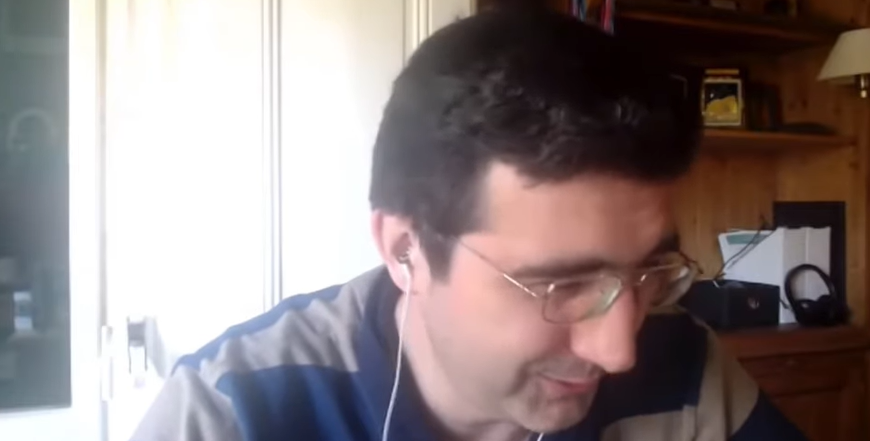Daniel Naroditsky’s active life and career tragically collided with Vladimir Kramnik’s ongoing anti-cheating campaign. The chess community has been deeply unsettled by the controversy surrounding the two grandmasters, who were once separated by a generation but united by brilliance. Their names, which once denoted intelligence and mastery, are now associated with a warning tale about responsibility, obsession, and the frail mentality of contemporary rivals.
Through streaming, commentary, and instruction, Californian prodigy and Stanford graduate Naroditsky was incredibly successful in modernizing chess. He was especially well-liked by novices who viewed chess as both art and science because of his elegant explanations of intricate strategies. However, one of chess’s most renowned minds, Vladimir Kramnik, also criticized him on the same digital platforms that increased the reach of his instruction.
Kramnik started his campaign with the admirable goal of preserving the integrity of the game. His tactics, however, became more inconsistent as he started accusing several elite players of computer-assisted play, including Hikaru Nakamura, Alireza Firouzja, and finally Naroditsky. Using unconfirmed data and statistical models, Kramnik claimed that some performances were “mathematically suspicious.” Despite being portrayed as extremely effective, the methodology lacked emotional intelligence and transparency.
| Name | Vladimir Kramnik |
|---|---|
| Nationality | Russian |
| Birth Date | June 25, 1975 |
| Title | Former World Chess Champion (2000–2007) |
| Notable Achievements | Defeated Garry Kasparov in 2000, multiple elite tournament wins |
| Recent Controversy | Publicly accused Daniel Naroditsky of cheating; raised questions after Naroditsky’s death |
| Reference | https://en.wikipedia.org/wiki/Vladimir_Kramnik |
| Name | Daniel Naroditsky |
|---|---|
| Nationality | American |
| Birth Date | November 9, 1995 |
| Death Date | October 19, 2025 |
| Title | Grandmaster (2013) |
| Notable Achievements | Under-12 World Champion (2007), prolific streamer, chess educator |
| Reference | https://en.wikipedia.org/wiki/Daniel_Naroditsky |

The charges devastated Naroditsky, who had established his reputation on honesty and education. He said the attacks felt “personal” in one of his last interviews, adding that Kramnik had been one of his childhood heroes. Ironically, the betrayal of a mentor was remarkably similar to being defamed by an idol. His admission that it had “taken the joy out of chess” now seems incredibly prescient.
Kramnik’s response to Naroditsky’s untimely death at the age of 29 only served to heighten public indignation. Instead of expressing sympathy, he posted messages suggesting that Naroditsky’s death may have been caused by “substance abuse” and a “cover-up within chess institutions.” Because no official cause of death had been announced, the comments were widely denounced as being insensitive and speculative. Hikaru Nakamura and Nihal Sarin were among the other grandmasters who referred to the remarks as “reckless” and “unacceptable.”
The controversy surrounding Kramnik’s actions has turned into a reflection of contemporary competition culture, where the desire for justice can trump compassion and scrutiny can turn into harassment. Despite being tragic, Naroditsky’s passing has significantly raised awareness of mental health issues in intellectual sports. Since then, numerous players have discussed the psychological effects of performing all the time, the anxiety of unfounded accusations, and the loneliness that comes with playing chess online.
Kramnik himself describes his stance as misinterpreted and says he received death threats following the outcry. He contends that although his efforts to identify cheaters were especially creative, they were not well conveyed to a community that was unprepared for his direct approach. Even among former supporters, however, his persistent refusal to retract or apologize has greatly diminished sympathy.
This episode has significantly changed the chess scene. New ethical procedures have now been implemented by FIDE, which mandates that public accusations be investigated before being made public. Since fairness and compassion are essential to the game’s legitimacy, the policy seeks to strike a balance between transparency and dignity. Even though they are reactive, these reforms show a very clear recognition of the damage that unchecked speculation can do.
Spectators note that this story represents a broader change in competitive mental sports. Once admired for its serene intellectualism, chess has grown to be a popular form of entertainment with millions of viewers online. It’s thrilling, but the attention is harsh. Every emotional response, mouse click, and statistical anomaly becomes possible discussion points. Because of his candor, Naroditsky was adored by his students but also exposed to a never-ending audience.
For Kramnik, this encounter has clouded a career that was once characterized by grace and fortitude. His analytical approach, which once motivated a generation, is now burdened by suspicion. He asserts, however, that he is “fighting for the soul of chess.” Although his methods have proven to be emotionally costly and polarizing, his motivations may be rooted in nostalgia—a longing for a slower, more controlled era.

